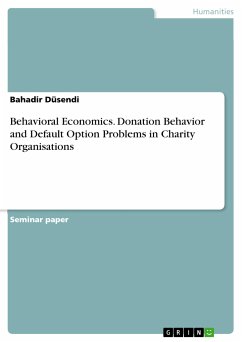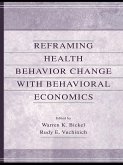Seminar paper from the year 2016 in the subject Psychology - Social Psychology, grade: 1,6, University of Paderborn, language: English, abstract: The so called nudging or setting defaults are getting more and more common. After the United Kingdom and the United States of America, Germany also got a nudging unit to affect laws by behavioral economic founding. Many aid organizations often struggle to collect enough donations in order to provide the help that is needed. By learning more about the donation behavior of individuals this problem might be solved. This study tries to find possible connections between donation behavior and default option problems. A lot of previous studies in behavioral economics show that setting defaults to opt-out are significantly influencing the behavior of the participants. Our experiment should analyze these findings concerning giving donations to charity organizations. We want to investigate if there are differences in donation between the opt-in and opt-out options. For that, we will conduct selling "Berliner" at two booths. At the first booth we will set the default 1EUR and ask for a 0.50EUR donation on top. At the second table we will set the default 1.50EUR with the opportunity, not to pay the 0.50EUR for donation, if the participant does not want to. First, we will build a theoretical framework for our study in which different default option studies will be introduced. Furthermore, a hypothesis is constructed following the results of these previous studies. Following our argumentation, it is hypothesized that the number of donations should be higher in the case of opt-out than in the case of opt-in. After the overall framework is explained, our experiment will be described in detail. At first the overall environment, structure and design of the experiment is described. Following, the implementations are stated. In the next chapter an analysis of our results is conducted. In the beginning our findings are presented in a number of charts and figures. Subsequently, these findings are analyzed and dis-cussed with a critical point of view. Possible improvements are mentioned and problems that occurred during the experiment described. At last an overall conclusion will be drawn with suggestions for further Research.
Dieser Download kann aus rechtlichen Gründen nur mit Rechnungsadresse in A, B, BG, CY, CZ, D, DK, EW, E, FIN, F, GR, HR, H, IRL, I, LT, L, LR, M, NL, PL, P, R, S, SLO, SK ausgeliefert werden.









